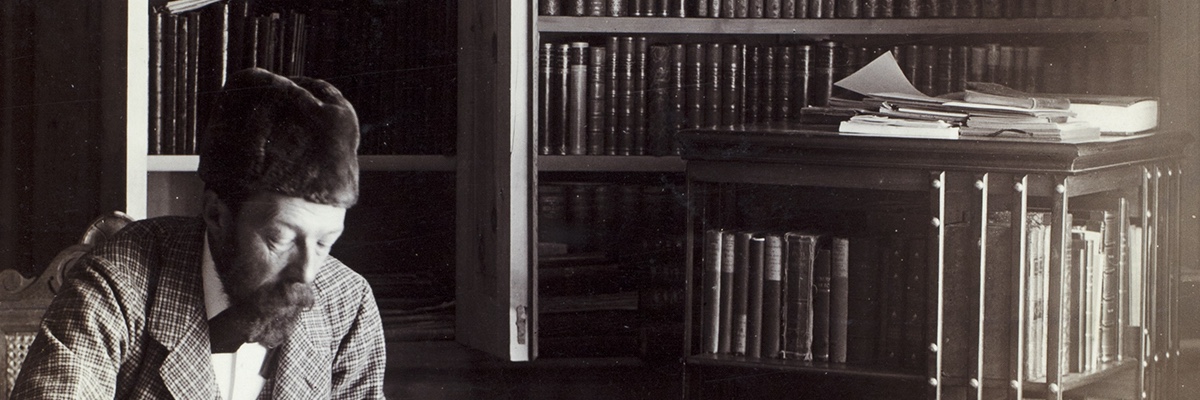In his Memoirs, Symonds describes his discovery of Plato–specifically the Phaedrus and the Symposium–as “the revelation I had been waiting for, the consecration of a long-cherished idealism. It was just as though the voice of my own soul spoke to me through Plato…” (Memoirs, 152). This refers specifically to the speeches made on love–particularly, “Greek love” between two men. As Symonds himself notes, these works realize a notion that he has been working towards for some time; however, they also, I believe, reflected elements of the world he had been living in at the time of discovery.
By his account, Symonds discovered these texts while reading Plato’s Apology for his schoolwork at Harrow. When discussing Harrow in his Memoirs, however, Symonds tends to put the focus less on the schoolwork and more on the social atmosphere—especially the overwhelming presence of sexual relationships between the students at the school. As he states in a chapter focused on the school:
One thing at Harrow very soon arrested my attention. It was the moral state of the school…The talk in the dormitories was incredibly obscene. Here and there one could not avoid seeing acts of onanism, mutual masturbation, the sports of naked boys in bed together. There was no refinement, no sentiment, no passion; nothing but animal lust in these occurrences. They filled me with disgust and loathing.
Memoirs, 147
In the Phaedrus, Plato gives two speeches to Socrates: the first, arguing for the friendship of a non-lover over a lover; and the second, the reverse. It is the first of these two in which Symonds may have seen the environment at Harrow reflected. The speech disparages the lover as a creature driven only by carnal desire, with no desire for betterment of the self or the beloved. In fact, both the lover and beloved are worse off for their relationship.
These things, dear boy, you must bear in mind, and you must know that the fondness of the lover is not a matter of goodwill, but of appetite which he wishes to satisfy:
“Just as the wolf loves the lamb, so the lover adores his beloved.”
Phaedrus 241 c-d
Given Symonds’ extensive distress over the “crude sensuality” and “animalisms” of the relationships that he saw at Harrow, it would not be a stretch to believe that he saw these very factors represented clearly in the Phaedrus. In fact, although he did not actually participate in a sexual relationship while at Harrow, Symonds describes the prevalence of these carnal pairings as something that caused him great moral distress, perhaps even to the point of physical weakening. Reading a speech that directly points at these relationships as the cause of similar moral and mental degradation in the participants may very well have made Symonds feel justified in his own feelings towards the relationships he was surrounded by.

Of course, it was the second of these speeches that Symonds saw himself in. This one, concerned with the argument of the lover over the non-lover, placed love as a “divine madness” that is ultimately a philosophical and aesthetic affair. Writing a “Myth of the Soul,” wherein all human beings are drawn likewise towards divine beauty and earthly sin, Plato (through Socrates) makes the case that the ideal love is divine in nature and something, in fact, to be sought. One key aspect of this, however, is self-control; giving in to lustful urges is something that can either cut this ideal love off at the start or at least reduce its positive effects, depending on the point at which control is lost.
If now the better elements of the mind, which lead to a well ordered life and to philosophy, prevail, they live a life of happiness and harmony here on earth, self controlled and orderly, holding in subjection that which causes evil in the soul and giving freedom to that which makes for virtue; and when this life is ended they are light and winged, for they have conquered in one of the three truly Olympic contests. Neither human wisdom nor divine inspiration can confer upon man any greater blessing than this.
Phaedrus 256 a-b
It was this concept of love that Symonds had been searching for and moving towards with his own thought. While of course his Memoirs were written in retrospect and so may very well have been influenced by the contrast between the two images of love in these speeches, it is truly striking how well they map onto the two types of male love that he encountered in his time at (and even before) Harrow: both the carnal relations of those around him, and the aesthetic ideal that he himself sought.
Work Cited:
Symonds, John Addington, and Amber K Regis. The Memoirs of John Addington Symonds : a Critical Edition. London: Palgrave Macmillan, 2016.
Plato, Phaedrus. http://data.perseus.org/citations/urn:cts:greekLit:tlg0059.tlg012.perseus-eng1:227a.

